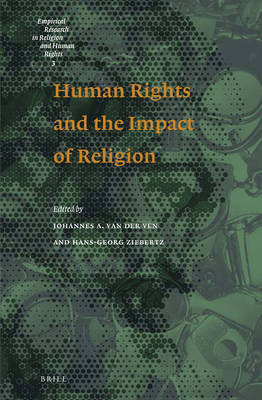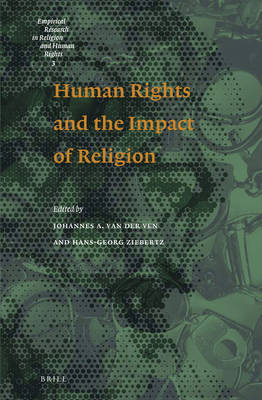
- Afhalen na 1 uur in een winkel met voorraad
- Gratis thuislevering in België vanaf € 30
- Ruim aanbod met 7 miljoen producten
- Afhalen na 1 uur in een winkel met voorraad
- Gratis thuislevering in België vanaf € 30
- Ruim aanbod met 7 miljoen producten
Zoeken
Human Rights and the Impact of Religion
€ 230,45
+ 460 punten
Omschrijving
This volume is about the impact of religion (beliefs and practices) on attitudes towards human rights of the first, second and third generation. The first four papers about the impact of Lutheranism, Calvinism, Catholicism and Islam are historical and theoretical of character. The six other papers are based on empirical research in England and Wales, Germany, Turkey, India, Norway and on comparative empirical research in six North-West European countries. From both groups of articles it appears that 'the' impact of religion does not exist. In varying historical periods and contexts various religions, c.q. religious denominations, have various effects on attitudes towards human rights, i.e. positive effects (+), ambivalent effects (±), no effects (0), and negative effects (-).
Contributors include: Francis-Vincent Anthony, Pal Ketil Botvar, Selim Eren, Leslie Francis, Üzejir Ok, Ruud Peters, Marion Reindl, Mandy Robbins, Rik Torfs, Johannes (Hans) van der Ven, John Witte Jr., Hans-Georg Ziebertz
Contributors include: Francis-Vincent Anthony, Pal Ketil Botvar, Selim Eren, Leslie Francis, Üzejir Ok, Ruud Peters, Marion Reindl, Mandy Robbins, Rik Torfs, Johannes (Hans) van der Ven, John Witte Jr., Hans-Georg Ziebertz
Specificaties
Betrokkenen
- Uitgeverij:
Inhoud
- Aantal bladzijden:
- 280
- Taal:
- Engels
- Reeks:
- Reeksnummer:
- nr. 3
Eigenschappen
- Productcode (EAN):
- 9789004251359
- Verschijningsdatum:
- 8/05/2013
- Uitvoering:
- Hardcover
- Formaat:
- Genaaid
- Afmetingen:
- 160 mm x 241 mm
- Gewicht:
- 566 g

Alleen bij Standaard Boekhandel
+ 460 punten op je klantenkaart van Standaard Boekhandel
Beoordelingen
We publiceren alleen reviews die voldoen aan de voorwaarden voor reviews. Bekijk onze voorwaarden voor reviews.







